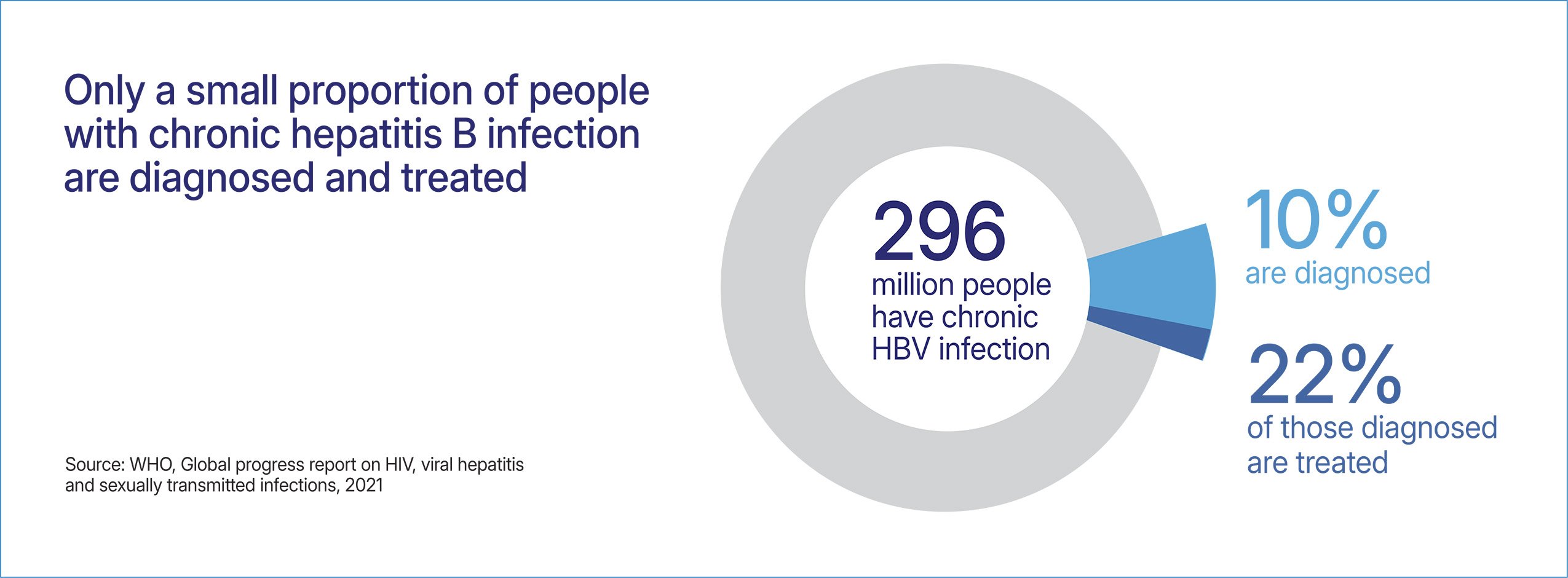Snapshot
- Most of the global burden of chronic hepatitis B is due to mother-to child transmission, but the hepatitis B virus (HBV) can also be acquired in other ways, including through vaginal or anal sex.
- Hepatitis B infections are a top driver of liver cancer and lead to more than a million deaths each year. Chronic hepatitis B takes a particularly severe toll in Africa and in the Western Pacific.
- People with HIV are at increased risk for hepatitis B infection.
Key Challenges
- Infections can be prevented, but use of prophylactic treatment during pregnancy and birth-dose vaccination remains low in some parts of the world.
- There’s no cure for chronic hepatitis B; available treatments may need to be taken life-long and may cause side effects.
Hepatitis B Advocacy Needs
- Are vaccines available to prevent hepatitis B? Yes, there is a vaccine to prevent hepatitis B.
- Are tests available to detect hepatitis B? Tests are available but can be difficult to access.
- How is hepatitis B detected? A blood sample is needed to detect hepatitis B.
- Can hepatitis B be treated? Yes, treatment options are available but must be taken for life.
Vaccines
Vaccines to prevent hepatitis B infection have been available for decades and are on the WHO List of Essential Medicines. By the end of 2022, 190 countries included hepatitis B vaccines in their infant immunization programs, and 84% of children received the full three-dose vaccine series. However, only about 45% of infants receive their first dose immediately after birth, as recommended.
Infant immunization is critical because nearly all cases of hepatitis B acquired in infancy and early childhood lead to chronic hepatitis B. By contrast, less than 5% of people who acquire hepatitis B as adults develop chronic disease.
Several therapeutic vaccine candidates are in clinical trials now. These vaccines aim to stimulate the immune system as a treatment for chronic hepatitis B.

Advocacy Needs
- Press for global coverage of birth-dose vaccine to ensure infants everywhere are protected.

Diagnostics
Of the estimated 254 million people living with chronic hepatitis B, only about 13% are aware of their infections. Blood tests, including newer point-of-care (POC) tests, can detect hepatitis B infection and determine whether the infection is acute or chronic. Increased use of these POC tests in community and clinical settings is important to link eligible people to treatment and vaccination.

Advocacy Needs
- More accessible point-of-care tests are needed, as well as better screening tools to identify asymptomatic infections.
Treatment
While chronic hepatitis B is not curable, use of antiviral medication can help stop the disease from progressing and keep some people healthy. However, only 3% of people with chronic hepatitis B are currently receiving treatment.
WHO recommends that people with chronic hepatitis B who have experienced significant liver damage and those with certain coinfections, including HIV, begin daily use of tenofovir, entecavir, or tenofovir alafenamide. People with hepatitis B who are pregnant should take antiviral prophylaxis until their infant has received 3 doses of HBV vaccine, to prevent transmission.
Alternative treatment options are in the pipeline, with several undergoing phase I or II clinical trials.
Advocacy Needs
- Continued and increased investment in curative treatment is essential to reduce the need for lifelong medication.